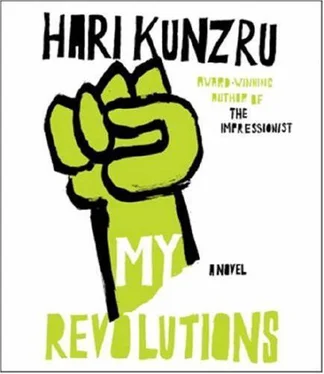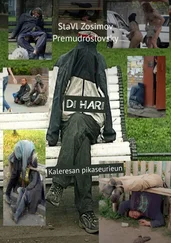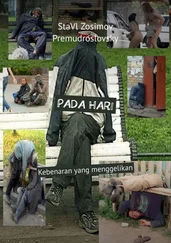thing only: the British state was beginning to make war on its own people. Tanks on working-class streets. Soldiers taking aim behind garden hedges. Our boys, the Fascist regime. The Prince of Wales’s Own went in on August 14, 1969. It became a kind of shorthand for us, August 14, proof that the logic of confrontation was being followed by the other side too.
Miles’s club was in a Georgian townhouse. We climbed a flight of narrow stairs and Miles signed us in, flirting with the young woman at the front desk. Heavily, deliberately, I wrote Michael Frame in the register. We sat on broken-down leather armchairs and I squirmed agitatedly around, trying to brace myself against sinking. The room projected an artful air of shabby comfort. Discreet waiting staff, discreet touch screens to process your order. It wasn’t one of those places where they make you wear a tie; if Miles had taken me somewhere like that I’d have been less disoriented.
“Would you like something to eat, Chris?”
“What exactly is it you do, Miles? I’ve never known what you do.” “You wouldn’t like to see the menu?”
“Not really. I want to know who you work for.”
“Christ, Chris, you might as well get lunch out of it. I’m not going to pretend this is all fun and games for you. I know what’s at stake.”
“You’re a consultant. That’s what you said. A political consultant. So who are your clients?”
“Like I said, I know what’s at stake. You’ve got a nice niche down there in Sussex. I can understand you want to hang on to it. And if you want this done with the minimum fuss, you need to get it into your head that I’m not going to answer all or even most of your questions, so you might as well calm the fuck down and order some lunch. Everybody needs to eat. I certainly need to eat.”
He realized the waitress was hovering, nervously. “Oh, hi. Let’s get two large gin and tonics and then I’ll have the fish pie. Glass of sauvignon with the pie.”
She turned to me.
“You have a vegetarian option? Fine. I’ll take that.”
The waitress left. Miles nodded gnomically. “OK,” he said. “Now
we’ve actually taken a breath, maybe we can do this in a civilized
fashion. In answer to your question, I work for myself.”
“You’re lying already.”
“I own and run a public-affairs consultancy, which has a number
of clients, some of whom you no doubt disapprove of. I’ve worked
for multinationals. I’ve worked for various special interest groups.
Trade associations, that kind of thing. I help them get what they
want from the political system. In the seventies I spent some time
working in the media. You remember I was interested in film-
making?”
“I remember that.”
“I ended up in television for a while. Current affairs.”
“You were a journalist?”
“Briefly. Mostly management. I had contacts. I got to know how
things work.”
“And now?”
“Now I want to know what you thought of Patricia Ellis.”
“She’s doing very well.” I shrugged. “She seemed to have a lot
of flunkeys.”
“She used to be a real firebrand, remember?”
“Did she?”
“Oh, come on. What about during all that Leyton business?
Quoting Mao in meetings. Talking about expropriating this and
smashing that.”
“I don’t remember you being at any meetings, Miles. I remember
you turning up one day out of the blue and asking a lot of ques-
tions. I remember you getting thrown out. I remember Sean Ward
punching you. Do you remember all that?”
“It was a misunderstanding.”
“Of course. And is this a misunderstanding too?”
“This is lunch, Chris.”
“At least call me Mike.”
The waitress came with our drinks. Without thinking, I gulped
my gin and tonic. Miles looked at me, his lopsided smile creeping across his face. “Well that seemed to go down easily. I knew your whole teetotal Buddhist thing was a con.”
I felt I’d tripped up. “It’s not a con. At least it wasn’t, not at the time. I don’t consider myself a Buddhist now, but I was. I’d be dead otherwise.”
“What happened to you?”
“When?”
“After you left.”
“I couldn’t deal with — anything. What had happened, anything. I drifted around in Asia, did too many drugs. It got very bad. Someone scraped me off the street in Bangkok and took me to a monastery. The monks used to treat addicts.”
“And they cured you.”
“That’s right.”
“They cured you and along the way they made you into a believer. So God got you in the end!” He did a little trumpet call, trilling his fingers in front of his face. “After all that!”
“Buddhists don’t believe in God.”
“But a believer, nonetheless.”
I had no comeback to that. First the revolution, then the Four Noble Truths. A compulsive believer, always mistaking my ideas for the world. “Wisdom is not scholarship,” said the monks. How I’d studied that saying!
The waitress returned with our food. I watched Miles fork fish pie into his mouth. It was frightening to hear my life tossed about in trite phrases, a joke to be capped with a punchline. It made me feel temporary, disposable.
His long jaw, masticating and grinding.
At Wat Tham Nok we stayed in huts, a wretched, emaciated crew, our jaundiced skins crossed with track marks and blackened by tattoos. We pottered about in our red pajamas, Thais and bird-shit foreigners together, looking at the floor, racked by withdrawal. The village of the damned. “Drink, drink.” Every morning, kneeling before a bucket, we downed a beaker of the mixture and waited
for the spasms to come. The acid reek of my vomit. The sounds of the men beside me, groaning and cursing. “Drink, drink.” The monks paced up and down behind us like drill instructors. The whole bucket of water was to be ingested, then spewed into the trough. Hard men, the monks. In their quarters they had pictures of accident victims, syphilitics, horribly mutilated corpses. Aids to contemplation.
“You know,” Miles was saying, “I’ve thought about you quite a lot over the years. I always felt you got caught up in something you had no control over. You didn’t seem like the others. You didn’t seem like an extremist.”
I had to smile at that. Miles was still the same, untroubled by doubt or hope and incapable of understanding it in others. He could live in the world as it is, which (depending on your point of view) is either pragmatism, coarseness, or a particular kind of heroism. Whatever it is, I’ve never been able to do it. The world has always seemed unbearable to me.
He called over the waitress to ask for a second glass of wine. “Sentiment aside,” he said abruptly, “you’ve made a mess of your life. You had brains and a certain amount of talent, unlike — let’s just take an example at random — the Minister for Police and Security, who’s generally considered around Westminster to be a dull biddy whose main talent is for worming her way up the greasy pole.”
“I don’t really follow politics, these days.”
“Is that so? You must admit it’s strange. To think about what she once believed and the job she does now.”
“She’s not the only one to have changed, is she?”
“We’ve all changed, but she’s the one in charge of a major Home Office portfolio. And when her boss is forced to drink hemlock, which can surely be no more than a few months away, she’s odds-on favorite to become Home Secretary. I mean, for Christ’s sake, be as zen as you like, but you have to see that’s some career trajectory. She was a self-proclaimed revolutionary. She was plotting the violent overthrow of the State.”
Читать дальше












